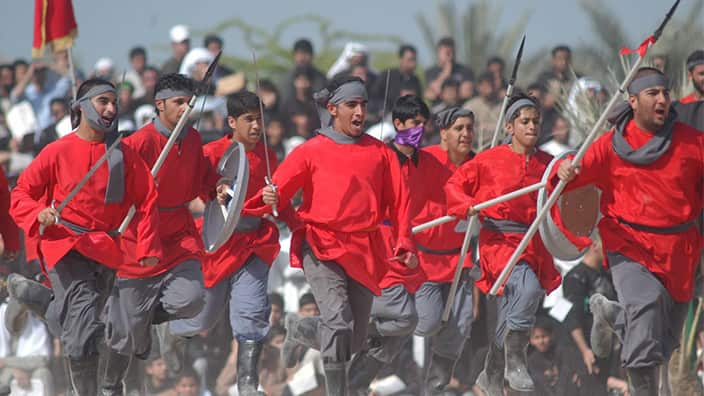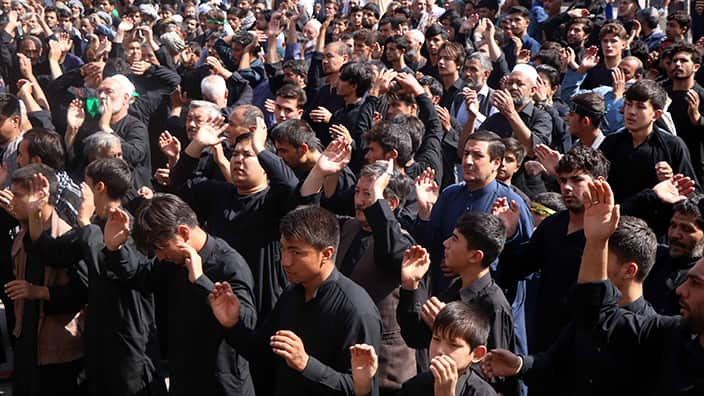What is Ashura?
As a word Ashura means the number '10', so it falls on 10th day of Muharram ( the first month of the Islamic calendar), and is marked by Muslims around the world.
Different Muslims sects observe the day in different ways.
For Sunni Muslims, it commemorates the day Noah left the Ark and the day God saved Moses from the Egyptian Pharaoh.
For Shia Muslims, Ashura is the last of ten days of mourning to commemorate the death of Prophet Mohammed’s grandson, Hussein, at the Battle of Karbala in present-day Iraq in 680 AD.
The killing of Hussein played a role in the Shia-Sunni divide that persists till this day.
Ashura rituals
Many Muslims fast on this day. Shia Muslims mark it with re-enactments of the Battle of Karbala. As it is a mourning event for Shias, they dress in black and parade the streets beating their chests and chanting to show their sorrow for the death of Hussein, his family members and followers.
As it is a mourning event for Shias, they dress in black and parade the streets beating their chests and chanting to show their sorrow for the death of Hussein, his family members and followers. A few imitate Hussein’s suffering by flagellating themselves until bleeding, a controversial practice that many Shia leaders forbid and reject.
A few imitate Hussein’s suffering by flagellating themselves until bleeding, a controversial practice that many Shia leaders forbid and reject.

Kuwaiti Shiite Muslims take part in an re-enactment of the battle of 680 AD in which Imam Hussein, the grandson of Islam's Prophet Mohammed. Source: EPA

Afghani Shi'ite Muslims devotees attend a mourning procession commemorating Ashura, in Herat, Afghanistan. Source: EPA
Ashura in Australia
Shias in Australia from different backgrounds, including Arabs, Indians, Indonesians, Burmese, Afghans, Pakistanis and others participate in an annual peace walk in Sydney and Melbourne to mark the day. In Sydney thousands are expected to march from Sydney’s Town hall to Central, and in Melbourne from Carlton Gardens to Flagstaff Garden.
In Sydney thousands are expected to march from Sydney’s Town hall to Central, and in Melbourne from Carlton Gardens to Flagstaff Garden.

File image: Shiite Muslims march from Hyde Park to the Botanic Gardens to mark Ashura in 2014. Source: AAP
In the first ten days of Muharram, Shias engage in religious sessions on theological, philosophical, and historical topics with a focus on Hussein and his followers, narrating their journey and drawing on lessons to be learned from their suffering, lessons of fighting for social justice and refusing to be oppressed by tyrants.
Historical Background
Imam Hussein is the son of Ali, the son-in-law of the Prophet Mohammed and the fourth caliph of the Muslim community.
After Prophet’s Mohammed death, a power struggle ensued over who will rule the Muslims. Ali was murdered in 661 AD, and his death paved the way for Muawiya to become caliph.
Muawiya’s son, Yazid, later became the caliph of the Umayyad dynasty, but Hussein refused to be ruled by him.
Hussein’s Philosophy
According to whoishussain.org, a global movement that organises charitable events for the common good inspired by the example of Hussein, “Hussein is a leader who made the ultimate stand for social justice in the face of corruption and tyranny.”
One of Hussein’s famous quotes “those who are silent when others are oppressed are guilty of oppression themselves” and “the most merciful person is the one who forgives when he is able to take revenge” are clear example of his philosophy.
Hussein was a religious righteous man who was keen in his words on “spreading good values and preventing evil.”
Share
